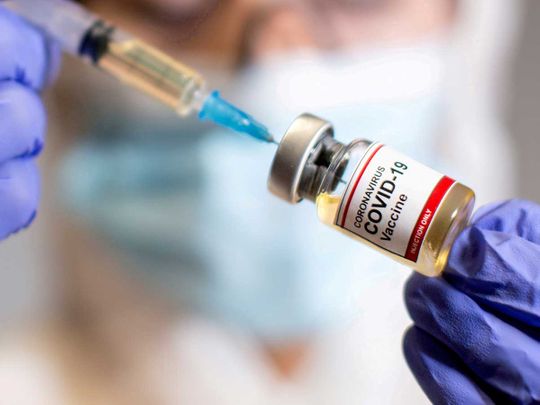
The Food and Drug Administration said on Wednesday that pharmacists can draw additional doses from vials of the Pfizer coronavirus vaccine, potentially expanding the country's supply by millions of doses as the Trump administration negotiates with Pfizer to speed up the next round of vaccine deliveries.
The government's existing supply of the first authorized vaccine can be stretched further after pharmacists began to notice that vials contain more than the expected five doses.
The FDA is in touch with Pfizer about how to handle this issue, the agency said. In the meantime, regulators say those extra doses from a single vial can be used.
"At this time, given the public health emergency, FDA is advising that it is acceptable to use every full dose obtainable - the sixth, or possibly even a seventh - from each vial, pending resolution of the issue," an agency spokesman said, confirming news first reported by Politico.
That means the supply of remaining vaccine could be up to 40 per cent greater, though the drugmaker cautions that it's uncertain how many extra doses are available. The FDA and Pfizer also caution that any leftover vaccine from different vials that is smaller than a full dose should not be mixed together , which experts say risks cross-contamination.
"The amount of vaccine remaining in the multidose vial after removal of 5 doses can vary, depending on the type of needles and syringes used," Sharon Castillo, a spokeswoman for Pfizer, said in a statement.
The Pfizer-BioNTech vaccine is also getting a boost from the White House this week with Vice President Mike Pence expected to receive a vaccination Friday, live on camera. Second lady Karen Pence and Surgeon General Jerome Adams are expected to be vaccinated as well.
Meanwhile federal health officials said Wednesday they are in talks with Pfizer to purchase tens of millions of additional doses this spring after the drug company said the United States probably would have to wait until summer.
Health and Human Services Secretary Alex Azar said he is "very optimistic" about negotiations in which federal officials are trying to help Pfizer ramp up production to meet the government's demand for the second quarter of 2021.
"We are working with them to provide them whatever assistance, now that they have identified some of the production challenges," Azar said at a Wednesday briefing.
The negotiations come after Pfizer told the Trump administration that other countries have rushed to buy most of the supply that will be available in the second quarter of the year. The federal government turned down an opportunity as recently as October to double its purchase of 100 million doses of the Pfizer-BioNTech vaccine, the first authorized for use in the United States, over disagreements on delivery dates.
Jeanne Marrazzo, director of the division of infectious diseases at the University of Alabama at Birmingham, said the potential for millions of extra doses is "incredibly good news," especially in light of the dispute over additional Pfizer-BioNTech vaccines.
"If vaccine is as good as its been in the trials, it's a silver lining of the fact that we didn't get as much of the Pfizer vaccine as we originally could have," she said.
Federal officials have insisted they have enough doses with other vaccines likely to receive emergency authorization, including the Moderna vaccine, which is expected to be cleared by regulators in the coming days.
Azar noted that the federal government has been more heavily involved in the development and manufacture of the five other coronavirus vaccines, which accepted government research funding. Pfizer declined the funding.
That made it harder for the federal government to intervene when Pfizer ran into production problems, health officials said.
"Part of our ongoing discussions is to remediate that and to get better visibility into what they are doing, what challenges they are facing, because they made significant commitments to us and others, " Azar said.
Pfizer disputed Azar's comments, saying through the spokeswoman that it does not "currently have manufacturing" issues and it has been transparent with the federal government on its production and distribution capabilities.
"They have visited our facilities, walked the production lines, and been a part of key decisions that have been made," said Castillo.
Pfizer CEO Albert Bourla said Monday that the company could provide an extra 100 million doses in the third quarter of the year and confirmed the negotiations to deliver the additional vaccine sooner.
"We are working very collaboratively with them to make sure that we can find ways to produce more or allocate the doses in their second quarter as well, but we haven't signed this agreement yet," Bourla said in an interview with CNN's Sanjay Gupta.
Trump administration officials on Wednesday defended their previous decision to decline to purchase additional Pfizer-BioNTech vaccine doses.
"You wouldn't buy something before you knew it works if you had six opportunities to have one provider provide you with what you needed," said Moncef Slaoui, chief science adviser to Operation Warp Speed, the initiative overseeing vaccine distribution.
Officials said they are on track to meet initial vaccine delivery targets this week, with deliveries to 636 facilities so far and an additional 886 planned for Thursday.
An additional 2 million Pfizer-BioNTech doses are scheduled for delivery next week, and 5.9 million Moderna doses are allocated if the vaccine clears regulatory hurdles in the coming days.








